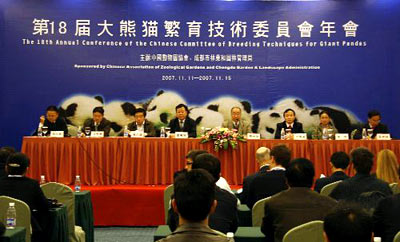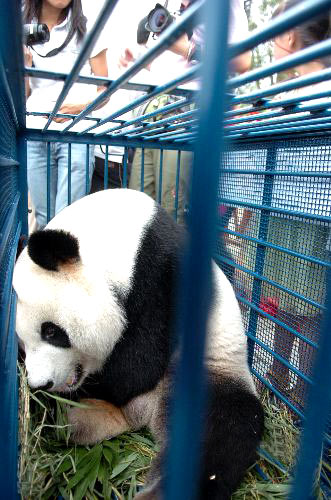Thirty-one giant panda cubs were born worldwide this year and 25 have survived, according to Zhang Zhihe, director of the Chinese Committee of Breeding Techniques for the Giant Panda.
Zhang made the remarks on Monday during the opening ceremony of the five-day 18th Annual Meeting of the Chinese Committee of Breeding Techniques for the Giant Panda held in the capital of Southwest China's Sichuan Province.
Panda protection organizations like the China Conservation and Research Center for the Giant Panda in the Wolong Nature Reserve and the Chengdu Research Base of Giant Panda Breeding have helped to achieve high cub birth and survival rates of the black and white animal.
According to the committee's work report for 2007, the Wolong center had 15 cubs and the Chengdu base, had 10, eight of which have survived. Zhang adds international breeding, research and cooperative programs were successful this year.
Tiergarten Sch?nbrunn in Vienna, Austria, has succeeded in giant panda breeding for the first time. In addition, artificial semen collection was done in the Atlanta, Memphis and National zoos in the United States, and in Japan's Adventure World in Shinahama, preparing a reserve of frozen semen for future breeding.
In September, a pair of giant pandas from the Chengdu base flew to the Madrid Zoo in Spain, starting a giant panda breeding project between China and Spain.
"A pair of giant pandas from Wolong has been selected to live in Australia and we are making preparations for their departure," Zhang said.
He added more facilities and space for scientific research, management and conservation education have been constructed worldwide.
The third phase of the Giant Panda Ecological Park in the Chengdu base with an investment of 350 million yuan (US$47 million) from the Chengdu municipal government was almost completed this year, with a newly built laboratory, veterinary hospital and quarantine hall put into operation.
The new panda houses are currently in use at Hong Kong's Ocean Park and the Madrid Zoo in Spain. Construction has started on a panda house at the Adelaide Zoo in Australia, preparing for the arrival of Wang Wang and Fu Ni, the pair of giant pandas from Wolong.
The Ministry of Science and Technology has ratified China's first key state laboratory on conservation of endangered wildlife including the giant panda this year.
Due to the combined efforts of the Cheungdu base, Sichuan University and the Wolong Center, the laboratory aims to be a leader in reproductive biology, conservation genetics, conservation ecology and disease prevention and control, Zhang said.
More than 80 officials and panda experts from animal protection organizations in eight countries attended the conference.
The Chinese Committee of Breeding Techniques for the Giant Panda was set up in Chengdu in 1989. Since then, the committee's annual meeting has become a major platform for exchanges between the world's panda experts.
Monday also marked the 20th anniversary of the founding the Chengdu base.
(China Daily November 13, 2007)







